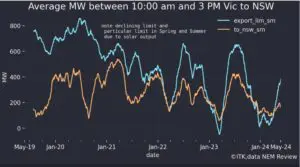One of Australia’s key financial regulators has issued a fresh call for the financial services sector to account for the risks posed by climate change, including the growing threats of litigation action seeking to hold banks and insurers accountable.
The Australian Prudential Regulation Authority (APRA) issued a new draft guidance on Thursday, saying that financial service providers needed to respond to the risks being created by climate change.
Major investor groups have issued calls for the increased treatment of climate change as a financial risk, and a threat to assets and infrastructure exposed to the physical impacts of a warming planet. They also highlight the risks to businesses and industries that fail to prepare for a transition to a low emissions economy.
In addition to the physical and transitional risks posed by climate change, APRA used its draft guidance to highlight the increased litigation risks posed to banks, insurers and superannuation funds, for potential failures to consider and respond to climate risks. APRA cited customers and stakeholders, as well as regulatory action, as sources of potential litigation risk.
“Climate change may also give rise to liability risks which have implications for businesses and directors’ duties. Liability risks stem from the potential for litigation if institutions and boards do not adequately consider or respond to the impacts of climate change,” the draft guidance says.
There have already been some early attempts to take legal action against groups like superannuation funds for failures to account for climate change in the way they manage member funds.
In one case, retail industry superannuation fund Rest was forced to settle legal action commenced by one of the fund’s young customers. The settlement secured a commitment from Rest to implement new processes for assessing and accounting for climate change in its investment decisions.
APRA warns the potential for similar litigation action in the future is likely to grow and could become a disruptive force for the financial services industry, unless it is proactive in incorporating climate change into its decision making. But the regulator stopped short of mandating any specific forms of response.
“Since the Australian Government became a party to the Paris Agreement, APRA has been raising awareness of climate-related risks to the financial sector,” APRA Chair Wayne Byres said. “Given the unique and long-term nature of the risks, however, processes to measure, monitor and manage climate-related financial risks are still developing.”
“The prudential practice guide doesn’t direct or prevent APRA-regulated entities making any particular business or investment decision. Rather, it is aimed at ensuring decisions are well-informed and appropriately consider both the risks and opportunities that the transition to a low carbon economy creates.”
The Investor Group on Climate Change, which advocates on behalf of institutional investors for stronger policies and frameworks to account for climate change, said the latest guidance from APRA was an important step forward.
“The draft APRA guidance sends a clear message to directors and trustees that climate risk is financial risk. It means assessment, disclosure and management of an organisation’s climate risk exposure is clearly identified as being consistent with proper risk management practices and regulator expectations.”
Herd said that Australia’s financial regulators should consider introducing stronger climate risk disclosure regimes, adding that while the current approach of voluntary reporting had been positive, Australia risked falling behind international peers who had implemented mandatory disclosure requirements.
“Voluntary climate risk disclosure has made some good progress on addressing climate risk to date. However, Australian investors have warned it is not delivering the rigour, consistency and comparability from company disclosure that is needed by financial markets to fully assess and address climate risk,” Herd said.
“Other markets are moving to mandatory climate risk disclosure regimes, including New Zealand, the United Kingdom, Hong Kong and potentially the United States. The draft APRA guidance serves as a good basis to begin moving towards a similar mandatory regime in Australia.”
APRA will undertake consultation on the draft guidance and is aiming to deliver a final guidance before the end of the year.










